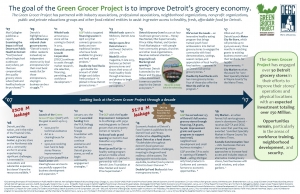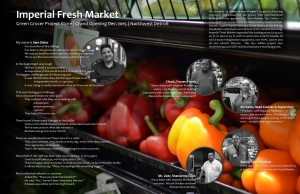Our final challenge of the year was to find a non-profit project partner in the city and craft an impact project, either as an individual or in a small team of our choosing. When I initially met with the Detroit Economic Growth Corporation (DEGC) we discussed a variety of ways they could use support. With my love for food, and knowing that my favorite kind of shopping will always be grocery shopping, telling the story of the Green Grocer Project made the most sense (of course there were other reasons too, but reflecting that feels most important).
The Green Grocer Project, a program developed on behalf of the DEGC has several components all aimed to strengthen the grocery economy in the city of Detroit and improve fresh food access. At a high level over the last decade, the Green Grocer Project has provided assistance to full service grocery store operators in the areas of technical assistance, financing, acting as a grocer clearinghouse, and addressing facade improvement projects. In addition, they have worked beyond the traditional grocery store models and have invested time and effort to assist alternative grocery models recently emerging in Detroit’s economy. In summary, the Green Grocer Project has engaged over 50 Detroit grocery stores (more than two-thirds in the city) in their efforts to improve their stores’ operations and physical locations with an expected investment totaling over $50 Million.
The purpose of my impact project was to create a storyboard in an effort to frame the unique aspects of the Green Grocer Project for use later in marketing materials, to share with other programs that may be considering grocer assistance, as well as use in submission of grant reports. What we found, looking back at Detroit’s grocery landscape over the past decade, that although it has been framed as a food desert, it is one no longer (and can be highly debated if it ever has been). There has been a misconception that the lack of national chain grocery stores means there is a lack of fresh food. There have been a number of full service grocery stores and available smaller convenient store locations. However, with minimal public transportation options available coupled with poor perceptions on offerings, these existing grocery stores haven’t been allowed the credibility they deserve.
The Green Grocer Project partnered with several other organizations, grant giving and impact investors included, to work through these issues as fore mentioned. After successful development and improvement efforts, they are now sunsetting the program and grandfathering grocery stores in Detroit into other program options available (i.e. Motor City Re-Store), but aim to tell its story first. We wanted to do two things: the first was understand how the Green Grocer Project evolved over the years, but also highlight the individual grocers in the story. With only a few weeks, we gathered all of the program’s historical material we could, did some crazy undergrad research style to overlay this over what the country and Detroit were experiencing, then dove deep into the narrative of Imperial Fresh Market through its people.
We’ve learned this: that there is always more work to be done. With grocery stores, opportunities remain particularly in the areas of workforce training, neighborhood development, and security.
There are some thumbnails below of our final product. Remember, don’t be intimated by the grocery store down the street if it doesn’t have a name you recognize — chances are that it’s better and held with more TLC than any national chain store.


